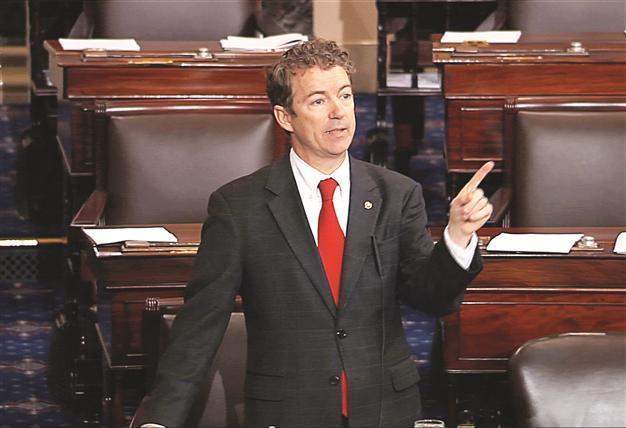US senator ends long floor speech blocking CIA pick
WASHINGTON – The Associated Press

Sen. Rand Paul. AP Photo
A Republican senator’s lengthy attempt to block confirmation of President Barack Obama’s nominee to lead the CIA, John Brennan, over questions about the possible use of unmanned drones against American citizens ended early Thursday, nearly 13 hours after he began speaking.Sen. Rand Paul, a son of former Libertarian presidential candidate Ron Paul and a possible candidate in 2016, started just before noon Wednesday by demanding the president or his attorney general issue a statement assuring that the aircraft would not be used in the United States to kill terrorism suspects who are U.S. citizens. His performance clearly energized his colleagues and even he seemed invigorated as the night progressed.
Paul finally finished speaking and ceded the floor at about 12:40 a.m. local time.
Democratic Majority Leader Harry Reid had been pushing for a confirmation vote to be held Wednesday, but those plans were dashed by Paul’s lengthy floor speech. After Paul stopped speaking, Democratic Sen. Dick Durbin filed a motion to cut off debate on Brennan’s nomination and bring it up for a vote.
The filibuster, as the delaying tactic is known, is the latest snag to befall Obama’s cabinet picks seeking confirmation in the Democrat-controlled chamber. So far, only Sen. John Kerry’s nomination for Secretary of State was approved by the Senate without any hitches.
Not all Republicans were so enthusiastic about Paul’s performance. Sen. Lindsey Graham said the prospect of drones being used to kill people in the United States was "ridiculous" and called the debate "paranoia between libertarians and the hard left that is unjustified."
Congressman Mike Rogers, the chairman of the House Intelligence Committee, said it is unconstitutional for the U.S. military or intelligence agencies to conduct lethal counterterrorism operations in the United States against U.S. citizens. Suggesting they can or might, Rogers said, "provokes needless fear and detracts attention from the real threats facing the country."
In a show of support, Republican Senate Minority Leader Mitch McConnell came to the Senate floor and congratulated Paul for his "tenacity and for his conviction." McConnell also called Obama’s choice of Brennan a "controversial nominee."
Paul said he recognized that he can’t stop Brennan from being confirmed. But he said the nomination was the right vehicle for a debate over the federal government’s ability to conduct lethal operations against suspected terrorists.
Paul, 50, received intermittent support early on from several other conservative senators holding similar views, plus Democratic Sen. Ron Wyden.
Dressed in a dark suit, white shirt and red tie, Paul read from notebooks filled with articles about the expanded use of the unmanned weapons that have become the centerpiece of the Obama administration’s campaign against al-Qaida suspects. As he moved about the Senate floor, aides brought him glasses of water, which he barely touched. Senate rules say a senator has to remain on the floor to continue to hold it, even though he can yield to another senator for a question.
"No president has the right to say he is judge, jury and executioner," Paul said.
Paul snacked on candy at the dinner hour while continuing to speak. Well-wishers with privileges to be on the floor shook his hand when he temporarily turned the speaking over to his colleagues.
Later in the evening Paul offered to allow a vote on Brennan if the Senate would vote on his resolution stating that the use of the unmanned, armed aircraft on U.S. soil against American citizens violates the Constitution. Democrats rejected the offer.
Republican Sen. Ted Cruz read Twitter messages from people eager to "Stand With Rand." And as the night went on, Cruz spoke for longer periods as Paul leaned against a desk across the floor. Cruz, an insurgent Republican with strong backing from the conservative tea party movement, read passages from Shakespeare’s "Henry V" and lines from the 1970 movie "Patton," starring George C. Scott.
The record for the longest individual speech on the Senate floor belongs to former Sen. Strom Thurmond of South Carolina, who protested for 24 hours and 18 minutes against the Civil Rights Act of 1957.
Holder came close to making the statement Paul wanted earlier in the day during an exchange with Cruz at a Senate Judiciary Committee hearing, according to Paul.
Cruz asked Holder if the Constitution allowed the federal government to kill a U.S. citizen on U.S. soil who doesn’t pose an imminent threat. Holder said the situation was hypothetical, but he did not think that in that situation the use of a drone or lethal force would be appropriate. Cruz criticized Holder for not simply saying "no" in response.
In a letter sent Tuesday to Paul, Brennan said the CIA does not have authority to conduct lethal operations inside the U.S.
Holder told Paul in a March 4 letter that the federal government has not conducted such operations and has no intention of doing so. But Holder also wrote that he supposed it was possible under an "extraordinary circumstance" that the president would have no choice but to authorize the military to use lethal force inside U.S. borders. Holder cited the attacks at Pearl Harbor in 1941 and on Sept. 11, 2001, as examples.
Brennan’s nomination won approval Tuesday by the Senate Intelligence Committee after the White House broke a lengthy impasse by agreeing to give lawmakers access to top-secret legal opinions justifying the use of lethal drone strikes against al-Qaida suspects overseas.
If confirmed, Brennan would replace Michael Morell, the CIA’s deputy director who has been acting director since David Petraeus resigned in November after acknowledging an affair with his biographer.
Brennan serves as Obama’s top counterterrorism adviser in the White House. He was nominated for the CIA post by the president in early January and the Intelligence Committee held his confirmation hearing on Feb. 7.
















